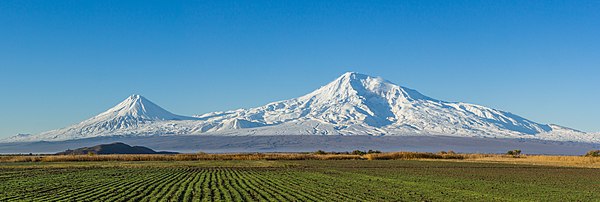Mount Ararat is a snow-capped and dormant compound volcano in the extreme east of Turkey. It consists of two major volcanic cones: Greater Ararat and Little Ararat. Greater Ararat is the highest peak in Turkey and the Armenian plateau, with an elevation of 5,137 m (16,854 ft); Little Ararat's elevation is 3,896 m (12,782 ft). The Ararat massif is about 35 km (22 mi) wide at ground base. The first efforts to reach Ararat's summit were made in the Middle Ages. However, it was not until 1829 when Friedrich Parrot and Khachatur Abovian, accompanied by four others, made the first recorded ascent. Despite the scholarly consensus that the "mountains of Ararat" of the Book of Genesis (8:4) do not refer specifically to Mount Ararat, it has been widely accepted in Christianity as the resting place of Noah's Ark. It is the principal national symbol of Armenia and has been considered a sacred mountain by Armenians. It is featured prominently in Armenian literature and art and is an icon for Armenian irredentism. Along with Noah's Ark, it is depicted on the coat of arms of Armenia.
This picture is a panorama of Mount Ararat and the Ararat Plain as seen from near the city of Artashat, Armenia, showing both Little Ararat (left) and Greater Ararat (right). The historic Khor Virap monastery can be seen in the background on the far left.Photograph credit: Serouj Ourishian
